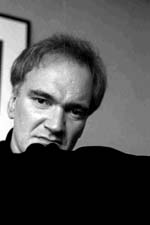|
Friday,
October 12, 2001
Talking
with Quentin Tarantino
Director expounds on ‘Iron Monkey’
release and the effects of the attack on movies
By Jack Mathews
Knight
Ridder
Normally, when a big-name director agrees to “present”
a foreign or obscure art-house movie in order to bring attention
to it in the mainstream press, the name is all you see.
But
in the case of Yuen Wo Ping’s “Iron Monkey,”
a 1990 Hong Kong action film that Miramax has retrieved from
the video racks for a major theatrical release, the presenter
— Quentin Tarantino — couldn’t be more enthusiastic
if he’d directed it himself.
“I
love Hong Kong kung fu movies, and Yuen Wo Ping is my favorite
director of them,” says Tarantino. “When Miramax
said Yuen couldn’t be here for the opening and asked
me to present it, I said, ‘Fantastic, I’ll be the
director in proxy.’”
In
fact, there’s an I-told-you-so element to the association
that Tarantino clearly relishes.
“I
told Miramax about Yuen six years ago,” Tarantino says.
“I said, ‘Get Jet Li, get Donnie Yen, put them in
a movie and get Yuen Wo Ping to direct it. They’ve never
done an American movie. Put them on contract.’ They said,
‘Yeah, yeah’ and that was that. Then came ‘The
Matrix’ and ‘Crouching Tiger, Hidden Dragon,’
and they wanted to be in the Hong Kong action movie business.’”
“Iron
Monkey” is the first of several archived Hong Kong action
films picked up for first-run release by Miramax in the United
States. If there’s a mainstream market for these films,
“Iron Monkey” is likely to find it. About a doctor
moonlighting as a robber who steals from the rich and corrupt
and gives to the poor, it’s essentially a Chinese version
of the Robin Hood legend.
“This
kicks it up on the action-adventure level, but it still has
the romance in there and it’s wrapped up in something
Westerners can identify with,” says Tarantino. “You
don’t have to know Chinese mythology or history to enjoy
the story, and the fights aren’t that violent. Kids can
enjoy it.”
While
the fight sequences resemble those fanciful duels Wo Ping
choreographed for “Crouching Tiger,” there are far
more of them. But it is still fighting as ballet, cartoonist,
illogical and masterfully inventive. Nobody seems to get hurt
badly enough to keep them down, and, given the timing of release,
that’s a good thing.
Still,
we can’t help wondering what Tarantino — who became
famous largely for his comic treatment of torture and mayhem
in “Reservoir Dogs” and “Pulp Fiction”
— thinks will be the impact of the Sept. 11 attacks on
movies.
“I
don’t really think things will change that much,”
Tarantino says. “The clichés may change. I think
that’s actually the history of cinema. The clichés
change, the tastes change, certain things go dormant for a
while, then they come back bigger than ever.”
Tarantino
says the kinds of films associated with him won’t be
affected, but movies like “Die Hard 2,” “where
you just blow up an airplane — boom! — that’s
going to change for a while.”
“I
have to admit when I watch a movie now and see a big skyscraper
or something blow
up, I think of those 6,000 people getting up that Tuesday
morning thinking they had their whole lives in front of them
and yet they didn’t even have the afternoon in front
of them.”
During
the week of the tragedy, Tarantino says, he played host to
a double feature for a few friends, showing them “Black
Sunday,” a 1977 film about a madman’s plot to terrorize
a Super Bowl crowd, and a compilation film he prepared using
action scenes from such mass-destruction films as “Die
Hard” and “Speed.”
“The
thing that jumped out at us, in light of the real tragedy,
is that (those movies) all seem very dated and quaint —
the whole concept of a brilliant criminal mastermind holding
a city ransom for millions of dollars. Dennis Hopper planting
bombs under the street (in “Speed”) just for the
money? That’s very quaint.”
Tarantino’s
latest project, “Kill Bill,” was put off until next
year when his star, Uma Thurman, became pregnant, and he says
he’s now happy not to have a movie in production.
“When
I run away with the circus, I want to run away with the circus,
and not have real life rearing its ugly head,” he says.
Given
Tarantino’s immediate success — his first two films
made him an international icon — his output has been
pretty thin. He’s acted in a bunch of movies, produced
a few, and put out a series of videos introducing his favorite
obscure films. But there’s been only one other feature,
1997’s “Jackie Brown.”
“People
think I’m not doing anything, but I’ve been working
my ass off writing,” he says. “I spent a year writing
a war movie I wanted to do, but it became like my great American
novel, and I had to set it aside for a while. Then I spent
another year writing ‘Kill Bill.’”
What
Tarantino says he’s guarding most against is becoming
a writer-director enchanted by big fees and a lifestyle that
puts you at their mercy.
“I
see so many writer-directors who become famous for their originality,
their voice, then get caught up in the (trappings of success).
They become professional Hollywood directors, they join the
union, get the big house and start living way beyond their
means. They have to keep making movies to keep up the lifestyle,
and to do that, they give up that thing that made them unique.
They can’t go back into the room and face the dragon
again.
“I
don’t want to make a movie for the wrong reasons. You
do that, and it’s hard to get back. If you fail on your
own, you can learn from the mistakes. But if you fail on somebody
else’s terms, you’re done.”
|
